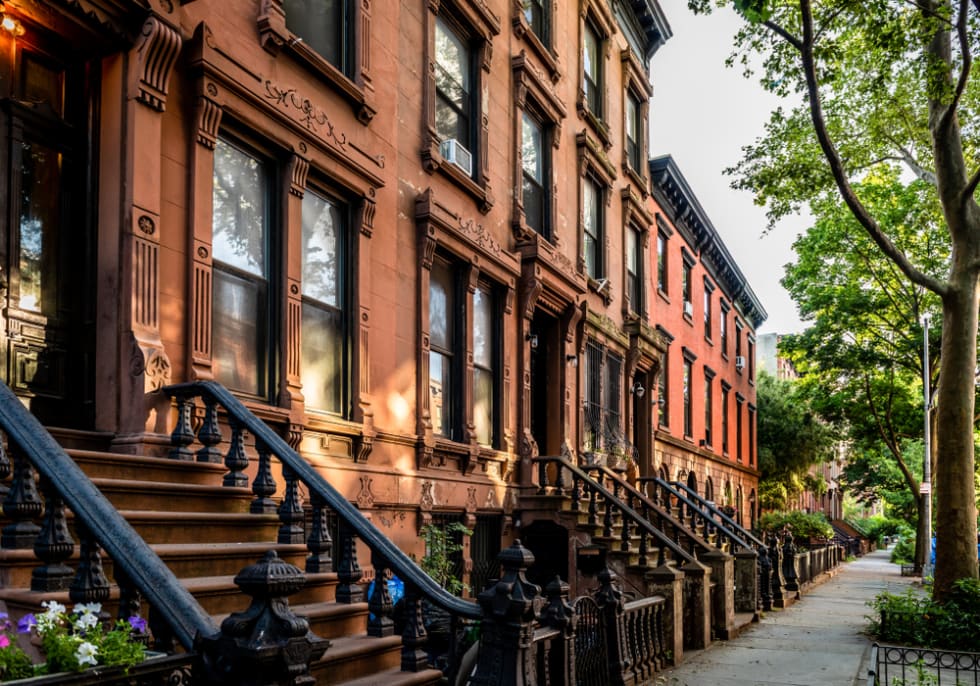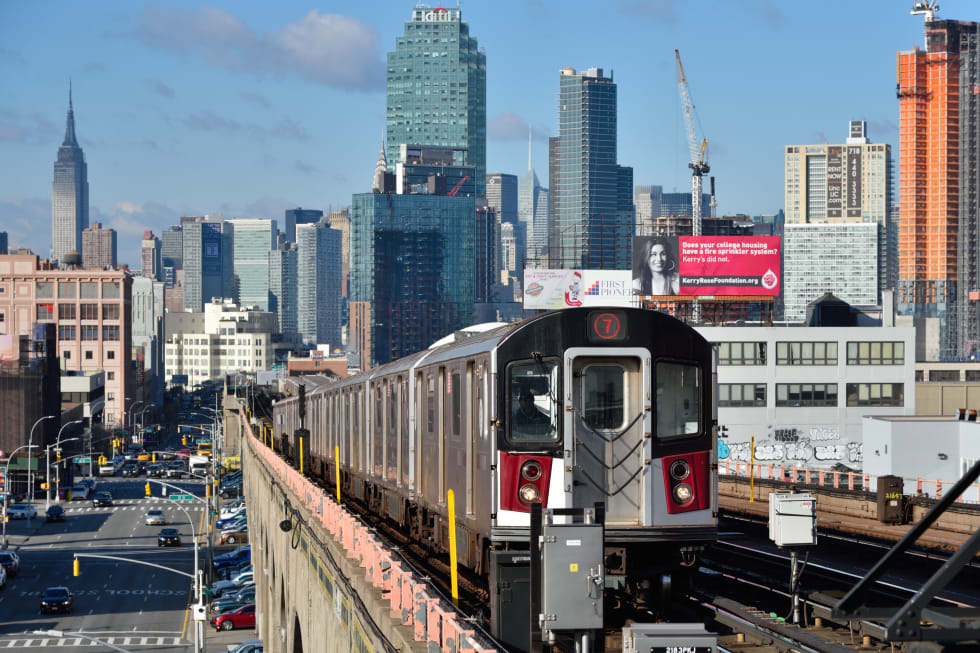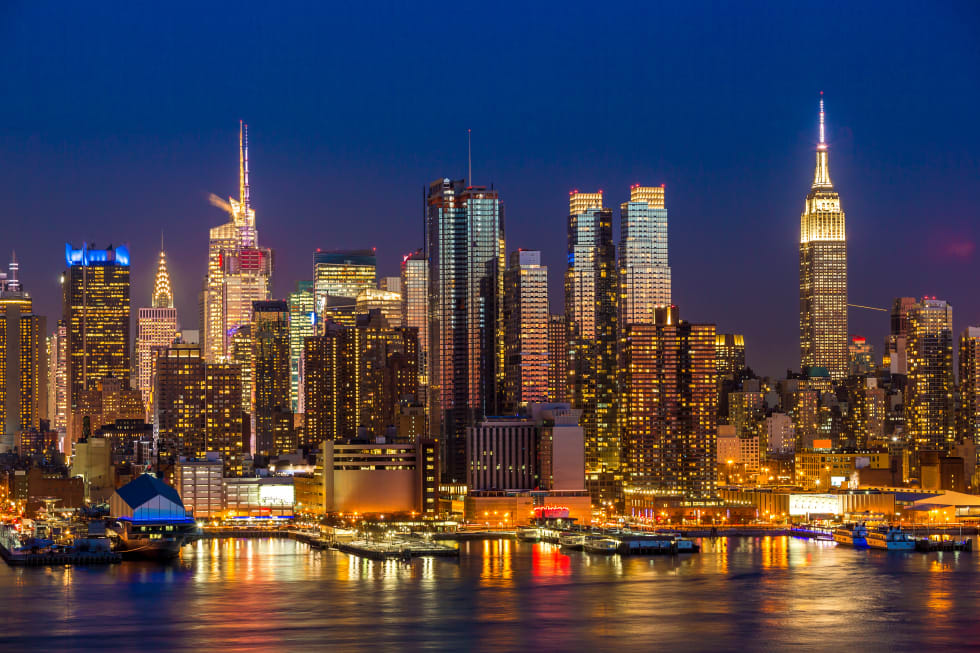- 22 units available
- Studio • 1 bed • 2 bed
- Amenities
In unit laundry, Patio / balcony, Granite counters, Hardwood floors, Dishwasher, Pet friendly + more

As of July 2025, the overall median rent in New York City is $2,480 after rising 1.1% last month, outpacing the national average (0.2%). Prices are now up 3.0% year-over-year. That makes New York the seventh most expensive large city in the country for renters.
New York may have a sky-high cost of living, but living here is totally doable. If you're smart with your budget—and a little flexible with your wish list—you might be surprised by what you can actually afford in the city that never sleeps.
From ambitious professionals to artists and food lovers, NYC draws people chasing big goals and bigger dreams. It’s a cultural heavyweight, a financial center, and a nonstop playground, all rolled into one.
Thinking of making the move? Congrats! You’re about to join millions of renters who’ve decided the energy, the opportunities, and yes, even the chaos, are worth it.
This guide breaks down everything you need to know to budget for life in the Big Apple—and how to live comfortably once you’re here.
The cost of living in New York City is $7,667 a month for rent and expenses for a single person. That's a whopping 60.8% higher than the national average. Much of this high cost of living is due to rent and housing, but let's look at the breakdown of each cost category to get a better understanding of the area.
| Cost of Living | New York City | New York | U.S. |
|---|---|---|---|
| Overall | 172.5 | 121.5 | 100 |
| Grocery | 116.6 | 103.8 | 100 |
| Health | 127.6 | 120.7 | 100 |
| Housing | 224.3 | 127.9 | 100 |
| Median Home Cost | $677,200 | $413,600 | $338,100 |
| Utilities | 150.5 | 115.9 | 100 |
| Transportation | 181.1 | 140.7 | 100 |
| Miscellaneous | 136.4 | 121.8 | 100 |
Keep in mind: these numbers are just citywide averages. What you’ll actually spend depends a lot on your neighborhood—and in NYC, prices may look different from block to block.
The area in New York with the highest cost of living is Manhattan, a diverse and bustling borough unlike any other. The average cost of living in Manhattan is $8,833 per month for a single adult—a whopping 104.1% higher than the national average.
| Cost of Living | Manhattan | New York | U.S. |
|---|---|---|---|
| Overall | 204.1 | 121.5 | 100 |
| Grocery | 120.4 | 103.8 | 100 |
| Health | 125.1 | 120.7 | 100 |
| Housing | 392.2 | 127.9 | 100 |
| Median Home Cost | $1,169,400 | $413,600 | $338,100 |
| Utilities | 150.3 | 115.9 | 100 |
| Transportation | 161 | 140.7 | 100 |
| Miscellaneous | 171 | 121.8 | 100 |
Further away from the action, you have The Bronx: a vibrant borough full of rich cultural history and bustling city life. The average cost of living in the Bronx is $6,733 per month for a single adult—still 41% higher than the national average, but much lower than Manhattan.
| Cost of Living | The Bronx | New York | U.S. |
|---|---|---|---|
| Overall | 141 | 121.5 | 100 |
| Grocery | 113 | 103.8 | 100 |
| Health | 124 | 120.7 | 100 |
| Housing | 156.6 | 127.9 | 100 |
| Median Home Cost | $505,700 | $413,600 | $338,100 |
| Utilities | 151.6 | 115.9 | 100 |
| Transportation | 190.8 | 140.7 | 100 |
| Miscellaneous | 112.1 | 121.8 | 100 |

As of July 2025, the average rent in New York City for a 1 bedroom apartment is $4,929, while the average rent for a 2 bedroom apartment is $7,299. Your final price tag depends on factors like neighborhood, building age, and perks such as in-unit laundry or a doorman.
For a one-bedroom apartment, expect to pay a median of $2,367 a month in New York City. For comparison, the median rent across the nation as a whole is $1,231 for a one-bedroom.
Two-bedroom apartments in New York City have an overall median rent of $2,496 as of July 2025. For context, the median rent across the nation as a whole is $1,387 for a two-bedroom.
According to the latest U.S. Census Bureau data, the median home value in NYC is a sky-high $751,700 with median owner costs, including a mortgage, running $3,234 per month. Notably, median rent in the city is only $2,480, meaning that renting is probably a better deal for most residents than buying a house.

When budgeting to live comfortably in a new city, it’s important to utilize the standard rule of three. This rule simply states that to live comfortably and afford rent, one should earn at least three times the monthly rent before taxes.
For example, the median rent of a one-bedroom apartment in NY is $2,367. To live comfortably, a resident would need to earn at least $94,680 a year, $7,890 a month, or $45.52 an hour.
That said, it’s important to note that some New York City property management companies require prospective renters to earn at least 40 times the monthly rent. Be sure to check tenant salary requirements before submitting a rental application.
You may be able to circumvent that requirement by renting as a subletter.
Beyond the 30% rule, you should also consider the living wage in New York City. According to MIT living wage data, the living wage for New Yorkers is $33.31 an hour. That figure is the minimum you would need to afford the basic necessities like housing, food, and transportation, but doesn't account for debt repayments, travel, savings, and indulgences.
You can also look at the U.S. Census Bureau data. The median household income in New York, NY is $79,713 a year, $6,642.75 a month, or $38.32 an hour. That's near the median household income for the U.S. at $80,610 a year.
Owning a car is expensive, but you won't need one in New York City. According to our database, transportation is one area where you might save in New York City. The vast majority of New York residents commute to work via public transportation, biking, or walking.
A 30-day unlimited MetroCard pass costs a low $132, which translates to $1,584 annually for unlimited access to the subway and local buses. Beyond the savings, it's also difficult to find parking in New York City, let alone as part of your apartment lease.
The average single NYC resident spends $8,053 on transportation costs annually, while a family of four with two children spends $13,507.
According to SpotHero, the average cost of monthly parking in New York is $570 per month or $6,840 annually. You'll have to consider this cost on top of the 10.375% tax and an additional 8% surtax on parking, garaging, or storing cars in Manhattan.
To put it simply, groceries in New York are expensive. Compared to the average city in our database, New Yorkers spend 16.40% more on groceries. Here's a breakdown of grocery prices in the average U.S. city compared to Manhattan:
| Food Item | Average Price | New York Price |
|---|---|---|
| Steak | $15.62 | $15.62 |
| Ground Beef | $6.98 | $6.87 |
| Sausage | $5.06 | $5.67 |
| Frying Chicken | $1.45 | $1.47 |
| Chunk Light Tuna | $1.20 | $1.52 |
| Whole Milk | $4.70 | $4.69 |
| Eggs | $3.70 | $4.15 |
| Margarine | $1.51 | $2.01 |
| Parmesan Cheese | $4.62 | $6.02 |
| Potatoes | $4.97 | $4.44 |
A three-course meal for two at a mid-range restaurant will cost you $137.50, including gratuity.
However, the omnipresent food carts and stalls that adorn New York's streets will likely be more common food stops for you. The famed $8 hotdog, soda, and chips combo might not be the healthiest meal out there, but it's delicious, convenient, and cheap.
If you want to keep costs down and enjoy your time in the kitchen, the bare minimum you can expect to pay is $4,938 annually or $411.50 monthly for groceries. If you're feeding a family of four, you can expect to pay $14,474 annually or $1,206.67 monthly.
Healthcare costs are higher in NYC than the average city in our database, with NYC residents paying 35.33% more for healthcare. According to MIT, the average resident pays $4,195 annually toward medical costs each year, while a family of four pays $12,452.
It’s important to note that New York City has several city-operated health clinics dedicated to delivering free or low-cost healthcare. Additionally, you can find information about health insurance enrollment and options on the city's Health Department webpage.
If you need to purchase your own private insurance, head over to Healthcare.gov to find affordable coverage that meets your needs.

The average utility costs in New York City amount to $190.06 monthly, which is lower than the U.S. average of $207.06. This rate accounts for basic utilities, including water, electricity, and gas.
If you want to add on a cell phone plan and Internet (60 Mbps or More, Unlimited Data, Cable/ADSL), you'll spend another $124.08 per month. Keep in mind: New York City can get hot and sticky in the summer months and cold in the winter. Chances are high your heat is included in your rent when you live in New York City, but electricity for air conditioning is almost never included in rent. Plan for spikes in your utility bills accordingly.
Your utility rates will also differ based on your personal preferences, your apartment, and your lease agreement.
That said, it's important to include cell phones and internet service when estimating your utilities.
The average single New York City resident spends $2,975.52 on fitness and entertainment costs annually. A family of four spends $11,902.08.
So, where do these funds go? We've got a breakdown of some of the most popular fitness and entertainment options that the city has to offer and how much they'll cost you. Let's dive in.
You might be someone who works best with a tribe of like-minded lifters. If so, expect to spend around $162.96 monthly for a gym membership.
If you're keen on fitness and cost-efficiency, you might enjoy home gym sessions that allow you to work up a sweat in your living room. A fitness app like Peloton might be your best bet. At $12.99 a month, it's a steal.

Although Central Park gets all the hype, New York plays host to over 1,700 parks. These parks are free, fun, and offer fitness opportunities for the whole family.
Regardless of the team you're rooting for, you'll need to consider the cost of attending a game in your budget. Here's a breakdown of the average ticket costs for some of New York's sports teams.
Whether you're a culture buff, an art lover, or simply looking for an inexpensive way to kill a few hours over the weekend, New York City's museums will deliver.
The city is home to a collection of museums, famous throughout the world. If you move to the city, they'll be right in your backyard.
The combined city and state sales tax rate in New York City is 9%, but can vary depending on what you purchase and its cost.
New York State levies an income tax rate on a sliding scale. Depending on your income, you can expect to pay anywhere from 4% to 10.90% in income tax. Additionally, you'll have to pay the city's imposed income tax which ranges from 3.078% to 3.876%, depending on your income.

Moving to New York City is challenging; there's no way around it. However, if you budget correctly and catch a great deal on your dream apartment, you'll be living in the Big Apple in no time.
Ready to start your New York City apartment hunt? Take our quiz!
Bensonhurst is among the cheapest neighborhoods in NYC, with starting rents around $2,200. Statewide, Utica and Buffalo are some of the most affordable New York cities.
It's almost 216 miles between New York City and Boston. Depending on the traffic, it takes about four hours to drive from New York City to Boston.
New York is 100.3 miles from Connecticut. It takes almost 2 hours and 30 minutes in moderate traffic to get from New York to Connecticut. You can take i-684 and I-84 E from New York to Connecticut. Train service is also available.
It is 71.1 miles from New York to New Jersey. It will take almost two hours to drive between New York and New Jersey using I-95 S. Some public transportation options are available by train and bus.
New York is 790.1 miles from Chicago. It takes about thirteen hours to drive from New York to Chicago via I-80 W. Amtrak, and flight service is also available between New York and Chicago.
According to the US Census Bureau, the population of New York City was 8,478,072 in July 2024. The entire population of the state of New York is 19,867,248.
San Francisco is currently more expensive than New York City. Our Rent Report shows that a one-bedroom apartment in San Francisco costs $3,019. For comparison, a one-bedroom apartment in New York City costs $2,367. San Francisco rents rose 10.9% in the last year. In New York City, rents rose 3.3% during the same time period.
Boston is currently cheaper than New York City. A one-bedroom apartment in Boston costs $2,371, and a one-bedroom apartment in New York City costs $2,367. Our Rent Report shows that Boston rents have increased 1.9%% compared to this time last year. The rents in New York City climbed 3.3% over the same period.
Yes, Chicago is cheaper than New York City. According to our Rent Report, Chicago rents have increased by 4.7% year-over-year to a median one-bedroom rent of $1,687 a month. Rents in New York City climbed 3.3% over the same period to a median rent of $2,367 for a one-bedroom apartment.



In unit laundry, Patio / balcony, Granite counters, Hardwood floors, Dishwasher, Pet friendly + more
In unit laundry, Patio / balcony, Hardwood floors, Dishwasher, Pet friendly, Walk in closets + more